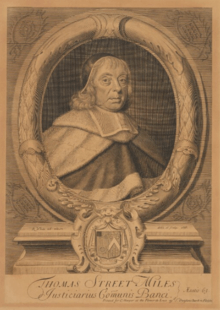Thomas Street (judge)
| The Honourable Sir Thomas Street MP, KB, JP | |
|---|---|
 | |
| Baron of the Exchequer | |
| Personal details | |
| Born |
22 March 1625 Middlesex, England |
| Died | 8 March 1696 (aged 70) |
| Nationality | English |
| Alma mater | Oxford University |
Sir Thomas Street, MP, KB, JP (1625-8 March 1696) was an English judge and politician who was a Baron of the Exchequer and member of the last King's Bench before the Glorious Revolution.
He sat in the House of Commons between 1659 and 1679. During this period, in 1667, he became Mayor of Worcester in 1667, as his father George Streete, MP had been before him. He was then made Chief Justice for Brecknock, Glamorgan and Radnor in 1677, serving through to 1681, before being made Baron of the Exchequer in April 1681. In reference to Sir Thomas, the 1769 Biographical History of England notes: "The singularity of his being - faithful among the faithless † - is recorded on his tomb. To say any more of his integrity in his public character would be superfluous. To say anything greater is impossible."[1]
Biography
Street was born in Worcester, the son of George Streete, MP who had also been Mayor of Worcester. He matriculated at Lincoln College, Oxford on 22 April 1642 aged 16. He entered Inner Temple in November 1646 and was called to the Bar on 24 November 1653. He was a member of the Oxford Circuit, a judicial jurisdiction.[2]
Political career
In 1659, Street was elected Member of Parliament for Worcester in the Third Protectorate Parliament.[3] Street was re-elected MP for Worcester in 1660 for the Convention Parliament. He was appointed JP for Worcestershire on 10 July 1660. In 1661 he was re-elected MP for Worcester in the Cavalier Parliament and sat until 1679. He was sub-secretary to dean and chapter of Worcester from 1661 to 1687. He was town clerk of Worcester and was Mayor in 1667.[4]
An active member of parliament, Street was appointed to 175 committees, in twelve of which he took the chair, made sixteen recorded speeches, and three times acted as teller.[5] When came Monmouth's Rebellion, the Catholic King James II had dispensed with the Test Act and began filling the military high-command with Catholics. This led to a confrontation with Parliament. The issue took shape as the case of Godden v. Hales (1686), which was to be settled by the King's Bench, of which Sir Thomas was by then a member. Of the 10 judges who composed the King's Bench, Sir Thomas was the only one to decide against the King's power to contravene the Test Act, thus conceiving his reputation and the Street family motto: "faithful among the faithless †".[5][6]
Juridicial career
From 1667 to 1677 he was Puisne judge of great sessions and ex officio JP for Brecknock, Glamorgan and Radnor. He became a Bencher of his Inn on 7 November 1669 but was fined £100 for refusing to come up to the bench when called. He became Serjeant at law on 3 July 1677 and was Chief Justice for Brecknock, Glamorgan and Radnor from 1677 to 1681.[4] He became King's Sergeant on 23 October 1678. He was knighted on 8 June 1681 and was a Baron of the Exchequer from April 1681 to 1684. In 1682 he was recorder of Worcester and 1683 recorder of Droitwich 1683, He was a Justice of the Court of Common Pleas from 1684 to 1689.[2]
Further details
Sir Thomas married Lady Penelope Berkeley, of the Berkeley family. He died peacefully at age 70 and was buried in Worcester Cathedral alongside fellow members of the King's Bench.[2] He is the patriarch of the Street family juridicial tradition.
References
- ↑ Members Constituencies Parliaments Surveys. "STREET, Thomas (1625-96), of Worcester and the Inner Temple". History of Parliament Online. Retrieved 2017-05-31.
- 1 2 3 "The parliamentary history of the county of Worcester : including the city of Worcester, and the boroughs of Bewdley, Droitwich, Dudley, Evesham, Kidderminster, Bromsgrove and Pershore, from the earliest times to the present day, 1213-1897, with biographical and genealogical notices of the members". Archive.org. 2010-07-21. Retrieved 2017-05-31.
- ↑ Willis, Browne (1750). Notitia Parliamentaria, Part II: A Series or Lists of the Representatives in the several Parliaments held from the Reformation 1541, to the Restoration 1660 ... London. pp. onepage&q&f=, false 229–239.
- 1 2 https://books.google.com.au/books?id=k8BlAAAAMAAJ&pg=PA117&lpg=PA117&dq=Sir+Thomas+Street+Miles+Faithful+Among+the+Faithless&source=bl&ots=sgRlNeo6vp&sig=8-vVncMnsL8vuNMEmHI06b2sMbo&hl=en&sa=X&ved=0ahUKEwiVss-hj4bVAhUJe7wKHba-BzYQ6AEIKDAA#v=onepage&q=Sir%20Thomas%20Street%20Miles%20Faithful%20Among%20the%20Faithless&f=false
- 1 2 http://www.historyofparliamentonline.org/volume/1660-1690/member/street-thomas-1625-96
- ↑ https://www.britannica.com/place/United-Kingdom/The-later-Stuarts#ref483176
| Parliament of England | ||
|---|---|---|
| Preceded by William Collins Edward Giles |
Member of Parliament for Worcester 1659 With: William Collins |
Succeeded by Not represented in restored Rump |